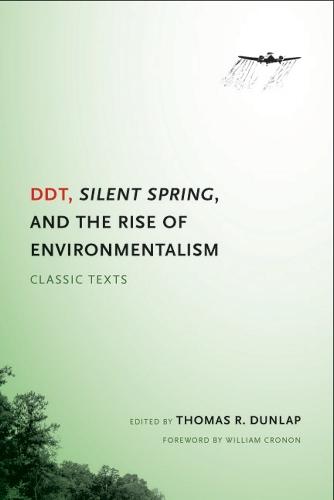Full Product Details
Author: Thomas Dunlap ,
William Cronon
Publisher: University of Washington Press
Imprint: University of Washington Press
Dimensions:
Width: 15.20cm
, Height: 1.30cm
, Length: 22.90cm
Weight: 0.227kg
ISBN: 9780295988344
ISBN 10: 0295988347
Pages: 160
Publication Date: 20 August 2008
Audience:
Professional and scholarly
,
Professional & Vocational
Format: Paperback
Publisher's Status: Active
Availability: In Print

This item will be ordered in for you from one of our suppliers. Upon receipt, we will promptly dispatch it out to you. For in store availability, please contact us.
Reviews
A superb collection. Included here are the texts that galvanized Rachel Carson to write Silent Spring and inspired her to insist on a new vision of cooperation between man and nature. Dunlap's book provides the context for one of the defining debates of our time and shows us why a resolution remains so elusive. Linda Lear, biographer and author of Rachel Carson: Witness for Nature To understand how DDT could win its developer a Nobel Prize and then be banned just decades later, read this book. Read it, too, if you want to understand the modern environmental movement. In these pages, those who helped make history tell you, in their own words, what happened. Edmund P. Russell, University of Virginia This is a wonderful collection that will prove quite useful for classes in environmental studies and American environmental history. Rachel Carson deserves far more attention in undergraduate courses, and this collection will facilitate that. Historians studying conflicts over pesticides will also find the selections thought-provoking and occasionally surprising. Nancy Langston, Professor, Nelson Institute for Environmental Studies, University of Wisconsin-Madison A fascinating and thought-provoking collection of texts that will give readers whole new perspectives on this critical controversy in the history of environmental thought. William Cronon, University of Wisconsin-Madison Students can use this collection to gain greater understanding of the development of the environmental movement, changing ideas about progress, science, and technology, as well as changing ideas about the role of nature in the modern world. David Stradling, University of Cincinnati
DDT, Silent Spring, and the Rise of Environmentalism provides an important survey of petrochemical use in the postwar United States. It is both a thought-provoking text for undergraduates and a diverse collection of primary sources for scholars..Dunlap valuably provides a succinct overview of the complicated relationships between industry, environment, and the chemical debate. Agricultural History Thomas R. Dunlap's purpose as editor is one of historian rather than judge; every essay- no matter which side it argues from- is precise, intelligent, and revealing of the biases and limits of the decade. Dunlap's introductions to each section adds hints of reflection and even redemption. Books like this remind people to treat today's new miracles with delicate care until they know where every path might lead. ForeWord
A superb collection. Included here are the texts that galvanized Rachel Carson to write Silent Spring and inspired her to insist on a new vision of cooperation between man and nature. Dunlap's book provides the context for one of the defining debates of our time and shows us why a resolution remains so elusive. Linda Lear, biographer and author of Rachel Carson: Witness for Nature To understand how DDT could win its developer a Nobel Prize and then be banned just decades later, read this book. Read it, too, if you want to understand the modern environmental movement. In these pages, those who helped make history tell you, in their own words, what happened. Edmund P. Russell, University of Virginia This is a wonderful collection that will prove quite useful for classes in environmental studies and American environmental history. Rachel Carson deserves far more attention in undergraduate courses, and this collection will facilitate that. Historians studying conflicts over pesticides will also find the selections thought-provoking and occasionally surprising. Nancy Langston, Professor, Nelson Institute for Environmental Studies, University of Wisconsin-Madison A fascinating and thought-provoking collection of texts that will give readers whole new perspectives on this critical controversy in the history of environmental thought. William Cronon, University of Wisconsin-Madison Students can use this collection to gain greater understanding of the development of the environmental movement, changing ideas about progress, science, and technology, as well as changing ideas about the role of nature in the modern world. David Stradling, University of Cincinnati
Author Information
Thomas R. Dunlap is professor of history at Texas A & M University. He is the author of four books including Faith in Nature: Environmentalism as Religious Quest and DDT: Scientists, Citizens, and Public Policy.




